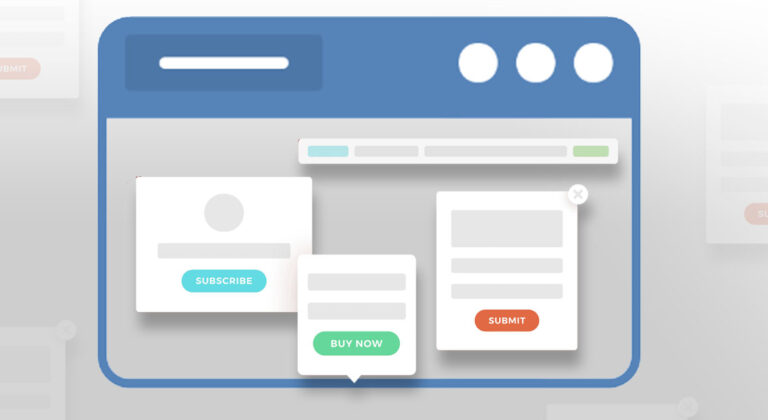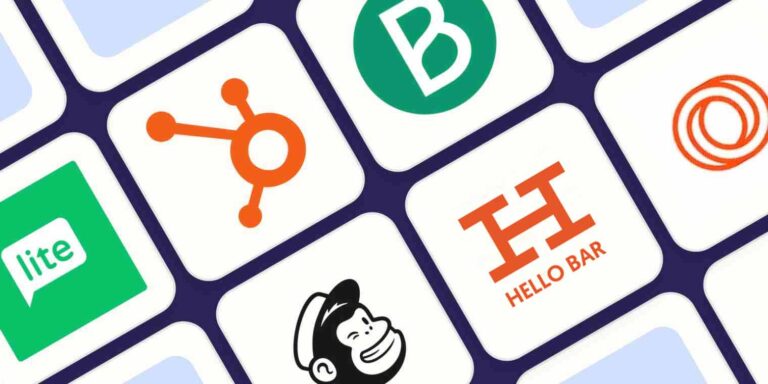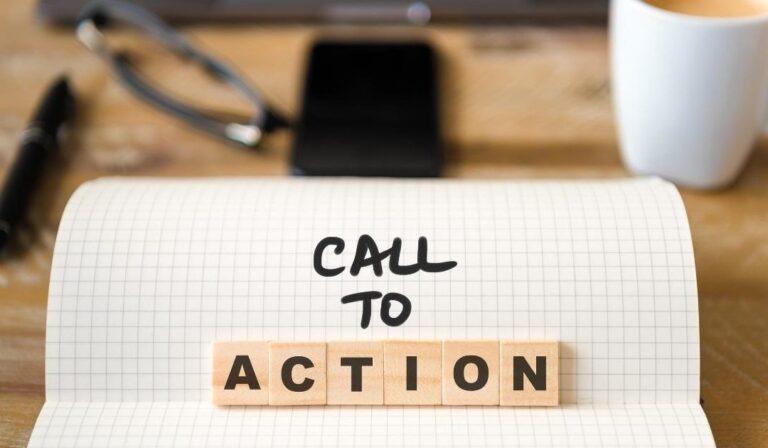Best Email Subject Lines: Tips to Create Yours and 25 Great Examples

I hope you enjoy this blog post. If you want Hello Bar to grow your leads, click here.
Author:
Ryan Bettencourt
Published
August 2, 2024
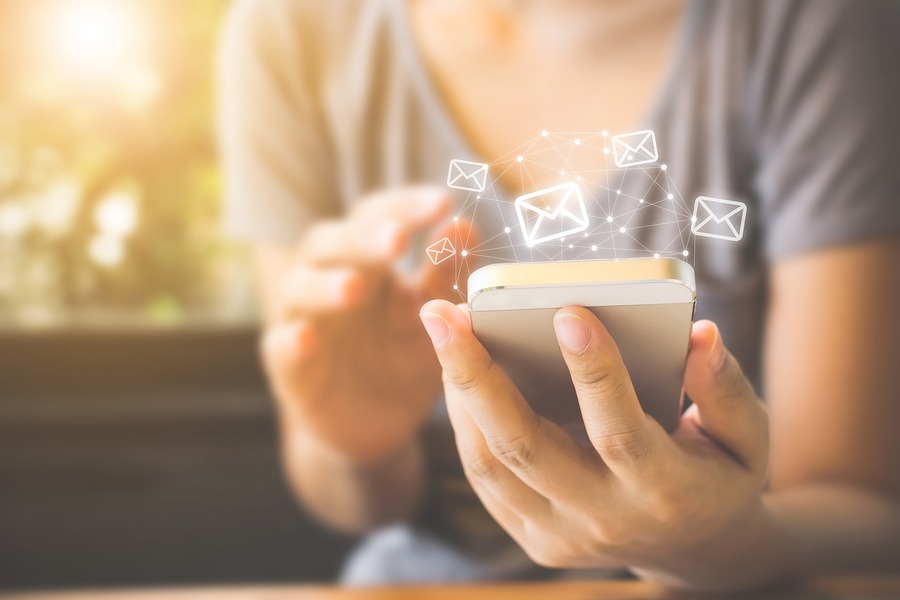
Crafting the best email subject lines is an art in email marketing. Think of your subject line as the headline of your email story, enticing readers to delve deeper.
A compelling subject line directly impacts open rates, engagement, and overall campaign success.
In this guide, we’ll unveil the secrets to writing irresistible subject lines. We’ll explore the psychology behind click-worthy lines, dissect successful examples, and provide best practices to turn your sales email subject lines into marketing champions.
From curiosity-sparking statistics to proven formulas, we’ll equip you with the tools to make your subject lines email superstars.
Email Marketing Statistics and Curious Facts
Did you know that the first email was sent by a computer engineer in 1971? In other words, email has a history dating back over 50 years.
Of course, most people didn’t have email in 1971. Recent Statista data, however, show that the number of email users globally was 4.26 billion in 2022. This number is expected to grow to 4.7 billion in 2026.
Email is an easy way to keep in touch with your customers, but it’s also fraught with perils. According to the Global Data and Marketing Alliance (GDMA), the global average of email opens in 2023 was 33.9%. Only 8.77% clicked to open, while 3.53% clicked through.
Those aren’t great odds. That’s why we need to make the best email subject lines to entice opens and further subscriber action.
You May Also Like:
- 32 Email Marketing Statistics to Highly Increase Your Conversions
- Email Pop Ups – 11 Best Practices to Insanely Grow Your Conversions
What Is the Subject Line of an Email?
The email subject line is the brief text that appears in the recipient’s inbox, summarizing the content of the email and enticing them to open it. It’s a critical component of email marketing, serving as the first impression and playing a significant role in determining open rates.
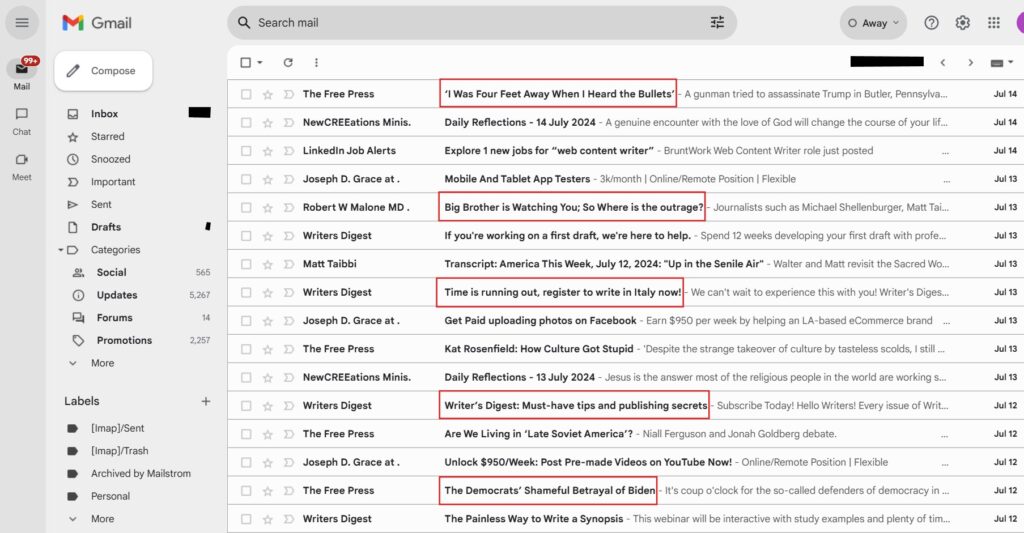
Image from Gmail
Unlike the email heading, which is the internal title or header within the body of the email itself, the subject line is visible before the recipient opens the email. So, it must capture attention immediately.
The best email subject lines strike a balance between being informative and intriguing. It prompts recipients to click and read more.
Why Is It Important to Have a Good Subject Line in an Email?
In the overflowing world of inboxes, your email needs a standout element to grab attention. Here’s why a well-written subject line is crucial for your email marketing success:
- Cuts Through the Clutter: Imagine hundreds of emails vying for your recipient’s attention. A strong subject line acts as a beacon, differentiating your message and increasing the chances of the receiver opening and engaging with it.
- Boosts Open Rates: Studies show that effective subject lines can significantly increase open rates. By sparking curiosity or offering a clear value proposition, you entice email recipients to click and delve deeper.
- Sets the Tone and Expectation: A well-crafted subject line sets the stage for your email. Whether it’s a light and breezy update or an informative announcement, it primes the reader for the content within.
- Improves Brand Recognition: Consistent use of clear and concise language in your subject lines can help establish brand recognition. Recipients begin to associate your brand with valuable and relevant content.
- Impacts Sender Reputation: A continuous stream of ignored emails can negatively impact your reputation. Well-crafted and engaging email subject lines encourage opens, keep your emails out of the spam folder, and help you maintain a positive sender standing.
- Avoids Spam Filters: Good subject lines must not trigger spam filters. If you want to reach your intended audience, avoid excessive use of exclamation points and spam trigger words.
- Boosts Engagement and Conversions: Ultimately, the goal of your email is to drive action. A compelling subject line captures attention and boosts engagement, conversions, and sales.
- Allows for Segmentation: You can use different subject lines to target different segments of your audience. By tailoring your subject line to specific recipient interests, you can increase the relevance and effectiveness of your emails.
You May Also Like:
- Email Drip Campaigns: 10 Tips to Greatly Increase Sales Using Emails
- 13 Top Opt-In Email Marketing for Success
What Makes a Good Email Subject Line?
The best email subject lines have one thing in common: They make the email irresistible to the target consumer. In other words, every email won’t work for every consumer.
You’re familiar with the conversion funnel, right?
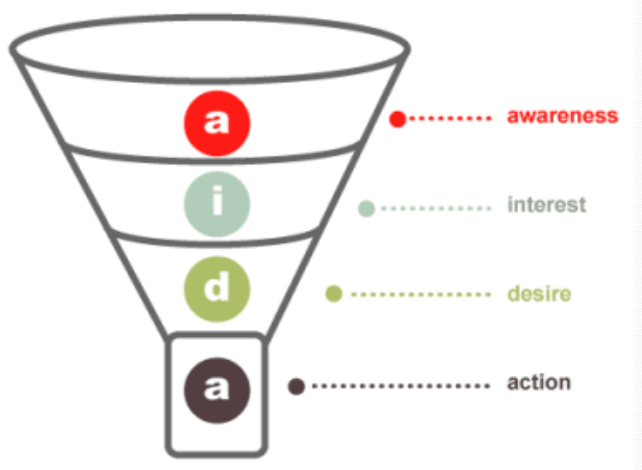
At each point in the funnel, consumers are looking for different types of content.
The top of the funnel, for instance, is wide open. It’s where prospects first become aware of their needs and — if you’re lucky — your brand. They’re looking for instructional information to help them better acquaint themselves with your offer.
If you send those folks a 20-percent discount, they probably won’t convert. They’re not ready.
You’re better off with a subject line that offers value through education.
That’s why the best email subject lines are tailored for a very specific audience.
How Can I Expand My Email List?
Many entrepreneurs count their email list among their most prized assets. The more emails you collect, the more opportunities you get to convert consumers.
But how do you collect more emails?
Hello Bar offers an elegant solution.
When you sign into your account, select the goal to “Grow Your Mailing List.”
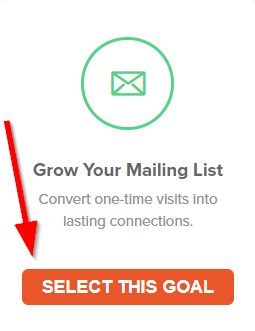
You can then decide exactly what you want your Hello Bar to say and how you want it to look.
![]()
When someone new visits your site, they’ll see the Hello Bar. If your offer is appealing enough, they’ll sign up.
Just ensure your offer is sufficiently appealing to encourage signups. You want visitors to see considerable value in the offer.
You May Also Like:
- How to Grow Your Email List: 21 Great Tips for 2024
- Email List Cleaning: Clean Your List Without Losing Conversions
Tips to Have in Mind When Creating a Great Professional Email Subject Line
The best email subject lines communicate something specific and value-driven to your recipients. In other words, they promise something wonderful if the prospect opens the email.
Follow these tips to keep your catchy email subject lines professional, persuasive, and effective.
1. Engage with Self-Interest
Your prospects are looking out for number one. You’re also looking out for number one, but you don’t want to appear that way. You want to be an informer in a world full of “meformers” — people who produce content to promote themselves. You want to produce content that serves others.
Your emails should provide something of value no matter what.
2. Incite Curiosity
In marketing, curiosity is a good thing. It means people are interested and want to learn more.
Think about parenting for a second. If you tell your child that they can’t go into a room in your house because there’s something you don’t want them to see, what happens?
Your kid will going to spend the next 1,960 hours trying every spy trick in the book to sneak undetected into that room. You’ll have a kid who could join the CIA tomorrow without any training.
We’re hardwired to satisfy curiosity. In your subject lines, tease some piece of valuable information recipients can only get from reading on.
3. Make an Irresistible Offer
We talk about offers a lot here on the Hello Bar blog. Offers are what make the marketing wheel turn.
Without an offer, you don’t have any takers. That’s just common sense, right?
But you have to deliver the best offer at the right time. What will convince your readers to click on your email? A subject line that’s impossible to resist.
- Offer a discount code or coupon
- Provide free shipping on any order for a limited time
- Release a new product at half its going rate
- Drastically discount a bundle of products or services
These types of offers compel users to click, if only to explore it further and decide whether or not it’s worth their time — or their cash.
4. Offer a Quick and Easy Fix
We love simple and easy things. What can we say? We, as humans, are pretty lazy.
If you can offer a quick and easy fix for a legitimate problem, your email subscribers will click. They won’t have a choice.
- Want to know how to unclog a sink in 60 seconds?
- Learn how to improve your email subject lines with 2 simple tricks
- Banish athlete’s foot for good with this one easy hack
See where we’re going? Tease a simple fix for a legitimate problem
5. Create Urgency and Scarcity
There are two types of urgency and scarcity:
- Legitimate
- Manufactured
You don’t want to manufacture scarcity or urgency. It might have worked 10 years ago, but consumers have gotten wise.
Confused? Let me explain.
You’ve probably heard about the department store pricing scandal. Consumers took screenshots of product pages on stores’ websites when the products were on sale and off. The prices were the same.
That’s manufactured urgency. People think they’re getting a hot deal, but they’re not.
Legitimate urgency and scarcity look like this:
- 2 Days Only: 20 percent off your next purchase
- Only 5 Left: Get Them Before They’re Gone
- Memorial Day Sale: Hundreds of Products at 10-50 percent off!
The catch? Each of these promises has to be true.
If you tell your email subscribers that you’re only discounting your product for two days, that sale better end in 48 hours. Similarly, if you say you only have five products left, there better not be 100 stored in boxes in your bedroom closet.
6. Educate Your Audience
Education is marketing that flies under the radar.
Gary Vaynerchuk proved this with his Wine Library TV show, which lasted for years on YouTube. Instead of pimping wines from his online store, he tasted wines and gave his honest opinion.
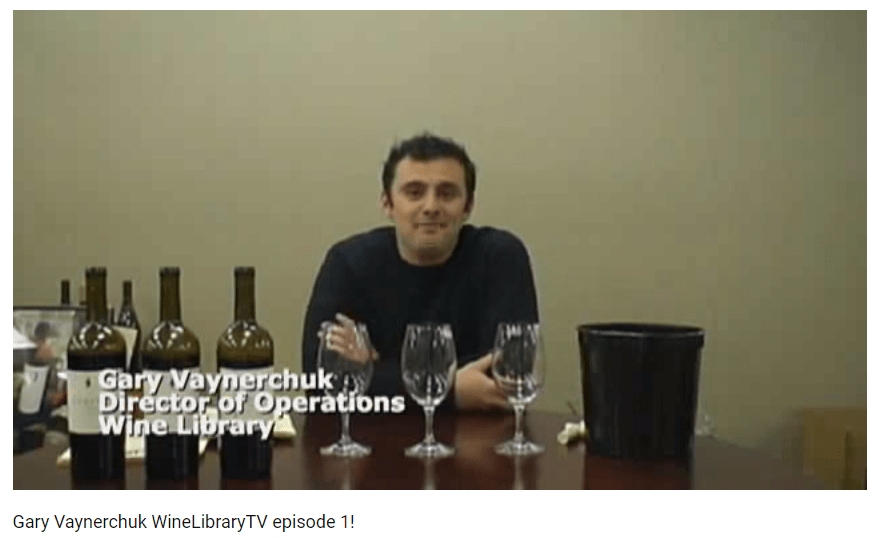
He used honesty and information to get people to buy. They’d listen to his vlog, then visit his website and buy wines based on his recommendations.
In your email subject lines, tell subscribers what you’re going to teach them. Let them know that there’s no sales pitch — just information.
7. Show Social Proof
Peer pressure doesn’t end at high school graduation. Today’s influencer marketing boom proves that.
People like to buy things others like. They either want to emulate the person who recommends the product or trust the person who made the suggestion.
Use testimonials, case studies, and lists of clients to further engage your email readers. You can even incorporate these things into your subject lines:
- [Expert’s Name] Agrees We Offer the Best At-Home Plumbing Tools
- [Number of Customers] Can’t Be Wrong!
- We Sold [Number of Products] of [Product] in X Days. See why!
8. Tease the Beginning of a Great Story
You’ve probably seen the clickbait headlines that often lead to trashy or largely irrelevant stories:
“One Man Ate 500 Hot Dogs. You Won’t Believe What Happened Next!”
That’s a made-up example (he probably threw up), but you get the point.
In your email subject lines, tease the start of a compelling story. Readers only get to learn the ending by opening the email.
You May Also Like:
- 17 Great Welcome Email Examples to Inspire Your Campaign
- 15 Email Campaign Examples to Create High-Converting Campaigns
Most Common and Successful Types of Email Subject Lines
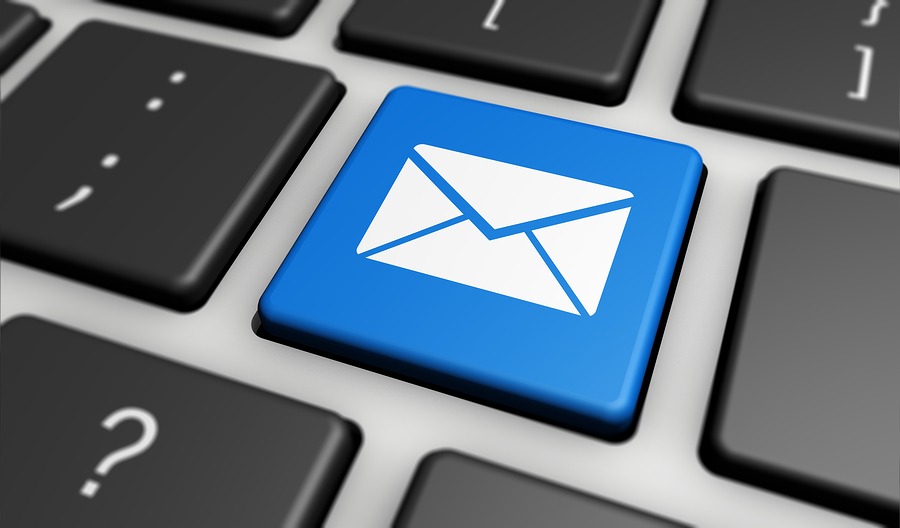
Let’s look at some email subject line examples and types that often prove successful among different audiences. You don’t have to use every one but test several variations to identify what your target customers respond to.
1. Fear of Missing Out Subject Line
This email subject line generates urgency. It suggests that if the consumer doesn’t act fast, they might not benefit from whatever you’re offering.
Also called FOMO, the fear of missing out plays on the very human desire to have and belong. People would rather spend money or time on something they might not enjoy than lose the opportunity to do something they might love.
2. Curiosity Subject Line
A simple question can prove compelling enough to inspire curiosity. The best subject lines establish a premise or ask a question. The email body content reveals the answer.
For instance, you might use a subject line like, “What’s the best email subject line for marketing emails?” It’s implied that you’ll supply the correct answer.
3. Pain Point Subject Line
Addressing a pain point can also be helpful in email subject lines:
- Are you tired of an aching lower back?
- Do you want to get more done every day?
- Stop unwanted text messages for good with this tip
You get the point. Here’s a real-life example from Grammarly.
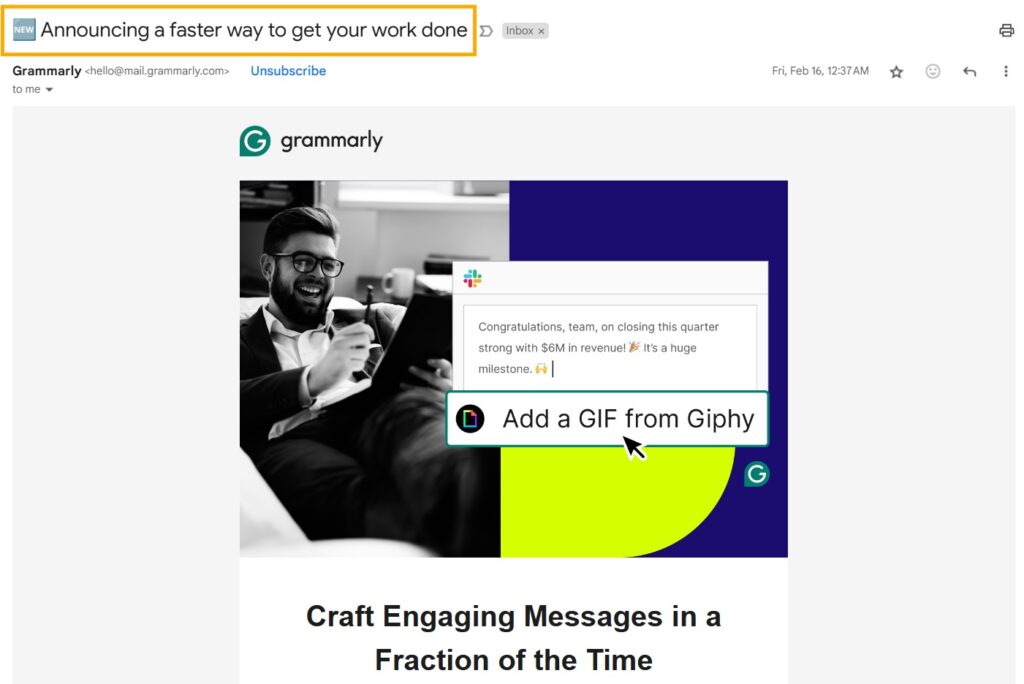
Image from Gmail
4. Funny Subject Line
Remember that humor is subjective. What one person finds hilarious, another might find dull — or worse, offensive. That’s why it’s important to keep humor subtle in your email subject lines.
Still, funny subject lines can establish rapport with your audience. They also show off your personality.
Uber once used the subject line, “Since we can’t all win the lottery …” It was designed to entice potential Uber drivers to sign up and make money starting immediately. The “$5 scratcher” in the email body aligns with the subject line.
5. Retargeting Subject Line
A retargeting email allows you to contact someone you’ve contacted previously. For instance, maybe a consumer has just bought one of your products.
You can send an email a few days later to ask if the customer has any questions. Reference the purchase in the subject line: “How are you liking your new water purifier?”
6. Greed Subject Line
Greed is simple. You want to appeal to your audience’s desire to save money, such as by hinting at a discount or other financial incentive.
7. Vanity Subject Line
Alternatively, appeal to vanity. Tell your prospect how they will look better, athletic, appealing, or attractive by following your advice and opening the email. Here’s an example from fitness instructor and personal trainer Alexander J.A Cortes.
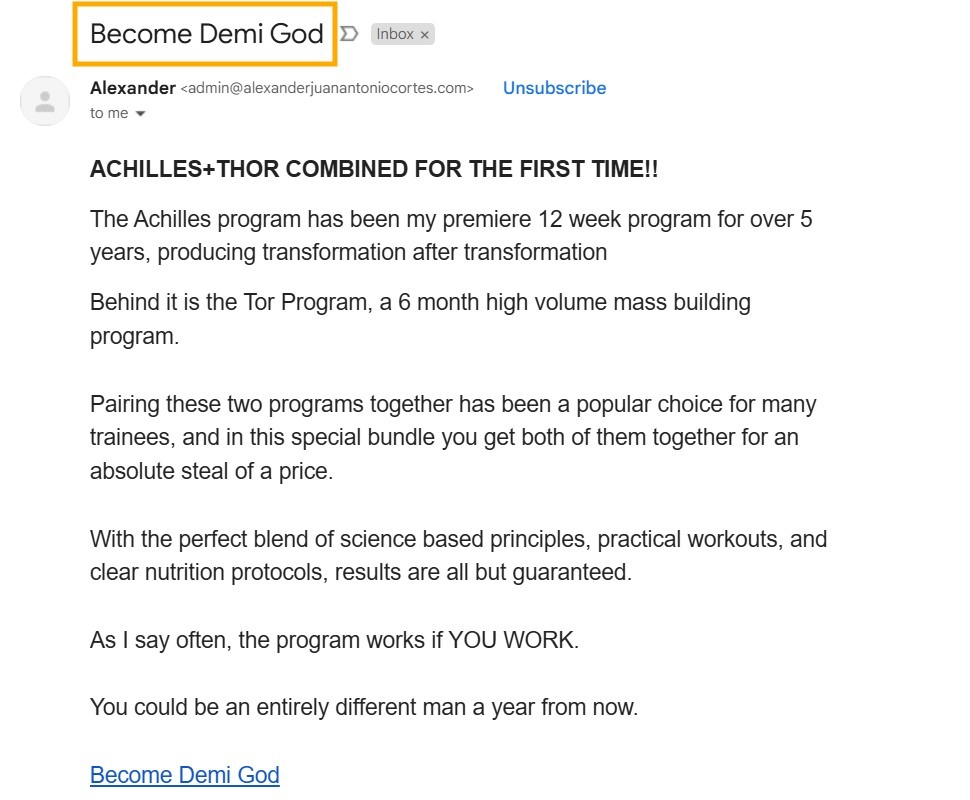
Image from Gmail
8. Start-of-Story Subject Line
As mentioned above, storytelling can be captivating in marketing copywriting. Use the subject line as the hook for your story, then follow up in the rest of your email body copy.
9. Urgency Subject Line
Creating a sense of urgency or time sensitivity can motivate email recipients to act quickly. Phrases like “Limited Time Offer” or “Only a Few Spots Left!” prompt immediate action to avoid missing out.
Subject lines that create a sense of urgency often include time-sensitive language or limited-time offers. By creating a feeling of scarcity, urgency helps drive quick decision-making and encourages the recipient to open the email.
10. Personalized Subject Line
Some of the best email subject lines are those that speak directly to the recipient. You can add a personal touch to your email by using the recipient’s name or referencing their previous purchases and browsing history. This makes it feel much more relevant.
Some examples of personalized subject lines that can significantly increase open rates include:
- Kate, Your Customized Travel Itinerary Awaits!
- Based on your last purchase, you’ll love this…
- We Miss You, [Name]! Come Back Soon!
Adding personalized details makes your subject lines feel more intimate while showing you value your recipients as individuals.
11. Numbered List Subject Line
Using numbers in newsletter subject lines can attract attention and indicate that your emails contain concise, actionable information.
There’s a reason lists are popular.
They’re easy to digest, and they suggest the content is valuable.
Some examples of how you can incorporate numbers to make your subject line more specific and enticing include:
- 3 mistakes you’re making with your email marketing
- 7 secrets successful entrepreneurs swear by
- Top 10 destinations for budget travelers
Here’s an example from entrepreneur Kieran Drew.
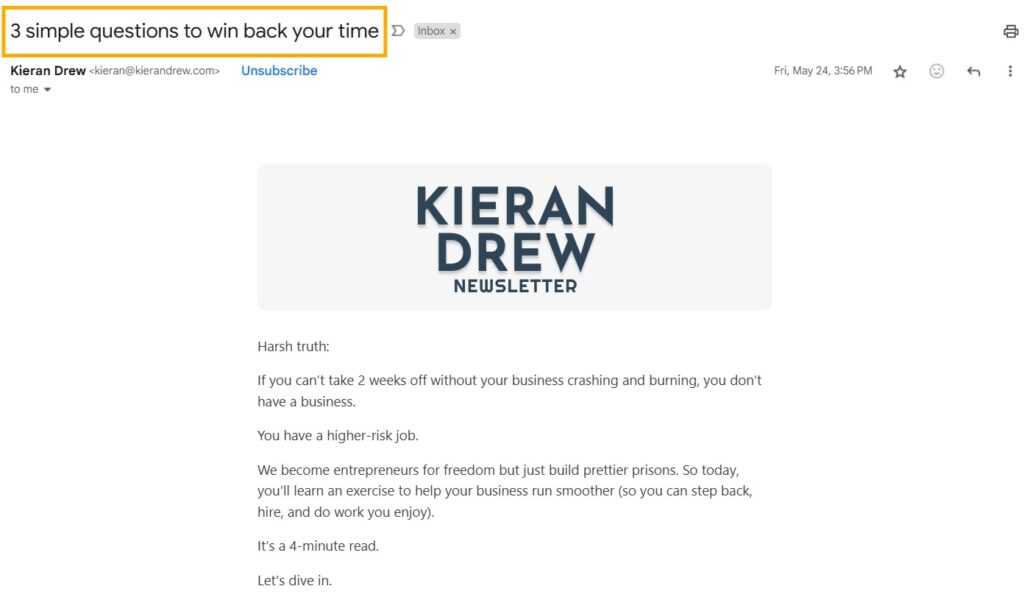
Image from Gmail
12. Question Subject Line
Posing a question in your subject line can engage readers, prompting them to seek the answer inside the email. A few examples include:
- Are You Making These Common Mistakes?
- What’s Your Biggest Health Concern?
- Ready to Boost Your Open Rates?
Questions stimulate curiosity and invite recipients to open the email for answers.
13. Social Proof Subject Line
Leveraging social proof in your subject line can help build trust and credibility. You can use the influence of others to indicate your product or service’s popularity and encourage opens.
- See why 10,000+ customers love our product
- As featured in Forbes: Our revolutionary approach
These subject lines highlight positive experiences from other customers or notable achievements.
14. Emoji Subject Line
Carefully selected emojis can add a touch of personality and fun to your subject lines. Emoji subject lines also stand out visually in an inbox. Here’s an example from Uber Eats.
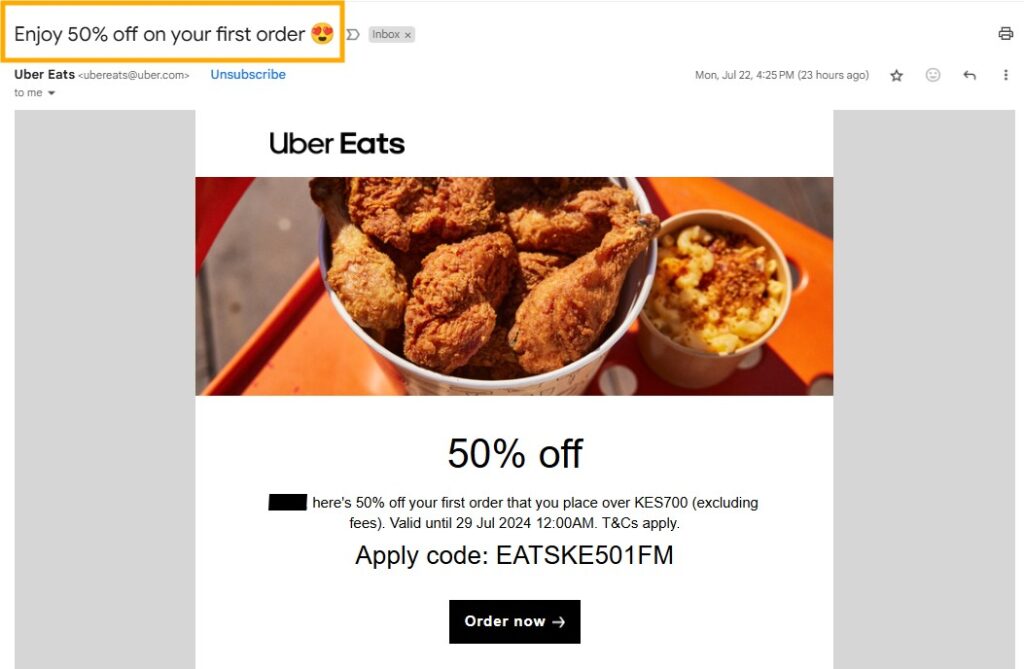
Image from Gmail
However, use them sparingly to avoid appearing unprofessional. A good practice is to test these with a small group first to see how your audience reacts.
15. Benefit-Driven Subject Line
Focus on your product or service’s specific benefits. Highlight how your email will solve a problem, improve the recipient’s life, or save them time or money. Some apt examples:
- Double Your Productivity with This One Simple Tip
- The Secret to Achieving Inbox Zero (Finally!)
16. Transactional Subject Lines
These subject lines inform recipients about transactional emails, such as order confirmations, shipping updates, or account information. Ensure it is clear and concise so the recipients can recognize their importance.
An example is “Your Order #1234 from [Brand] Has Shipped!” Here’s another from Network Solutions.
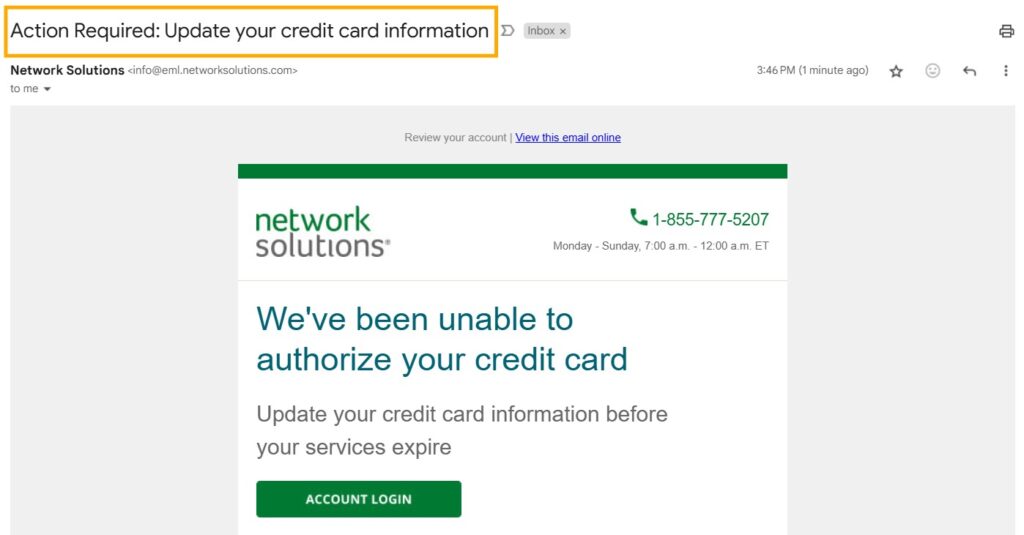
Image from Gmail
17. Seasonal Subject Line
Aligning your subject line to a current season, holiday, or event can make it timely and relevant. Here are a few examples:
- Get Ready for Summer with These Fashion Tips
- Black Friday Sale: Up to 70% Off!
Seasonal subject lines take advantage of timely relevance, making your email more appealing during specific periods.
You May Also Like:
- How to Generate Leads from Email Marketing: 11 Ways
- A Map to Creating Your Own Interactive Lead Nurturing Strategy
25 Effective Email Subject Line Examples
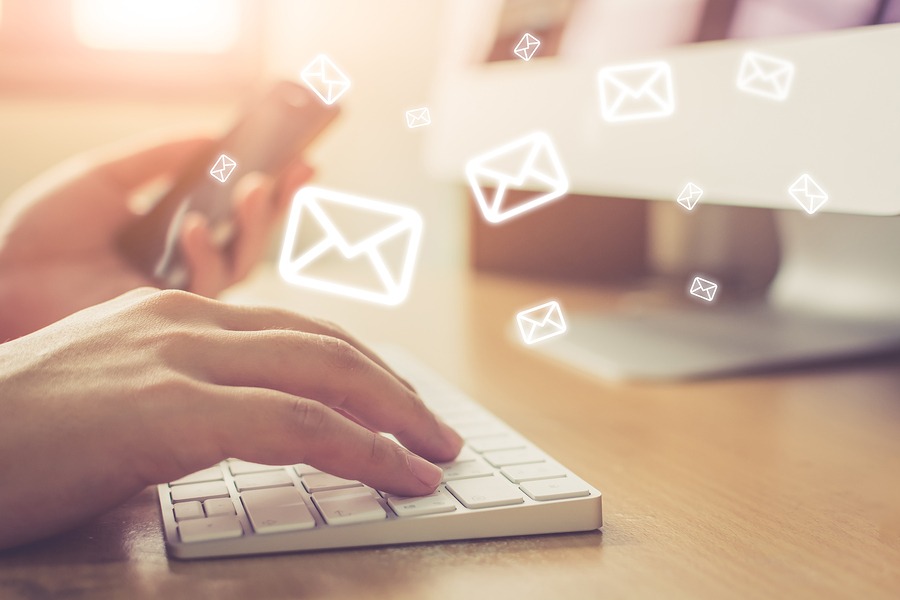
Let’s look at some real-world examples of great email subject lines. You can adjust them to fit your industry and target audience, and they could inspire your next email marketing campaign.
1. X Critical Questions Every [Customer Type] Must Know the Answer to…
This is an excellent educational email subject. For instance, it could be, “5 critical questions every runner must know the answer to.” You’re letting your prospect know that you’re delivering high-quality information.
2. Let’s Fix Your ___ Together
Here, we have an inclusive subject line where you fill in the blank. What do you want to help your target audience fix? Their hair? Their computer speed? It depends on your industry, but this is another educational subject line that works well for top-of-the-funnel prospects.
3. Great News: [Product’s] Price Just Dropped!
Here’s an a great subject line for a retargeting email. You know what products your customers have viewed, so send them an email if the price drops so they can reconsider the purchase.
4. Stop Wasting Money on [Blank]
This email subject line can fall into the FOMO, greed, vanity, or pain point categories. You’re telling your prospects that they have been spending too much money. The unwritten part of the email is the promise that you will help them rectify the situation.
5. Copy Our 10 Most Successful ___ for Free
If you’re in the B2B industry, this subject line can work well. You could give away templates, lead capture forms, or anything else that will help your target audience. For instance, if you sell marketing services, you could give away your 10 best ad copy for free.
6. LAST CHANCE! Super Sale Ends Tonight
Remember what we said about urgency, scarcity, and FOMO? This is how you hit on those categories. Let your prospects know you’re running a sale, but they’d better act fast because it ends very soon. Here’s a variation of this subject line from Joggy.
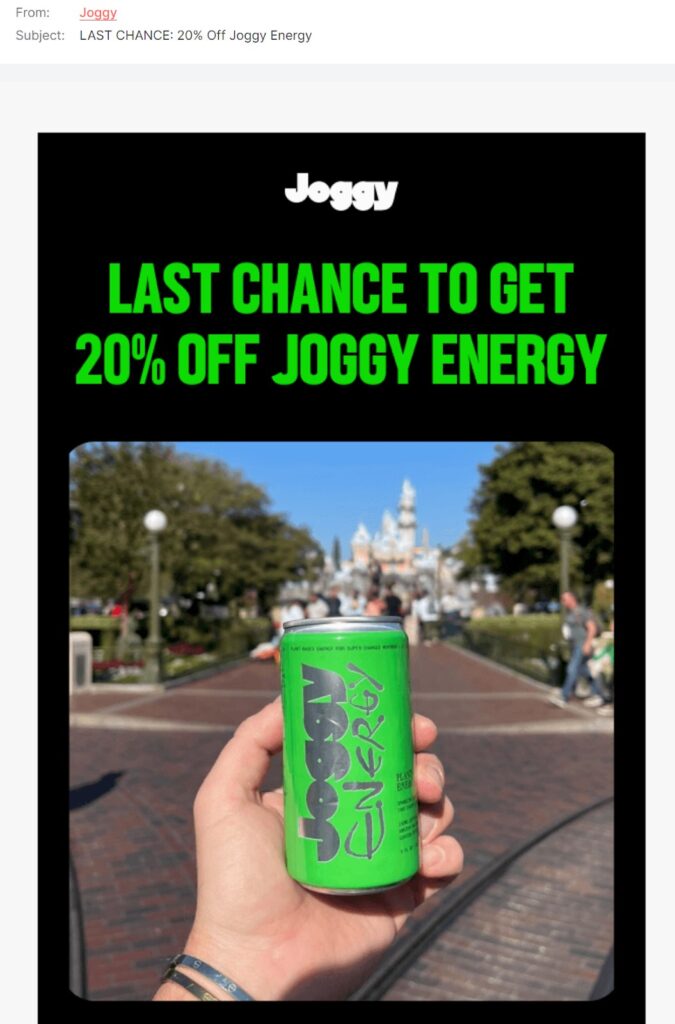
Image from Really Good Emails
7. Get these 5 Killer ___ Tips
When you’re generous with information, your prospects appreciate it. They might even return the favor by buying from you. Don’t be afraid to give away your best content for free, especially if it might mean sales down the road.
8. We are Starting in X HOURS
Thinking about hosting a webinar? Going live on Facebook? Creating an Instagram Story? Announce the event via email, but ensure people know they need to act fast. Tell your prospects how they’ll benefit from the event and when to tune in (and how).
9. Finally [Get Something Done]
Here’s one of the best pain point email subject lines. We all have tasks that we’ve procrastinated on for days, weeks, months, or years. Promise to help your prospect finally get it done — preferably faster, cheaper, or more quickly than they thought possible. Here’s how Gather introduces a host of requested product features.
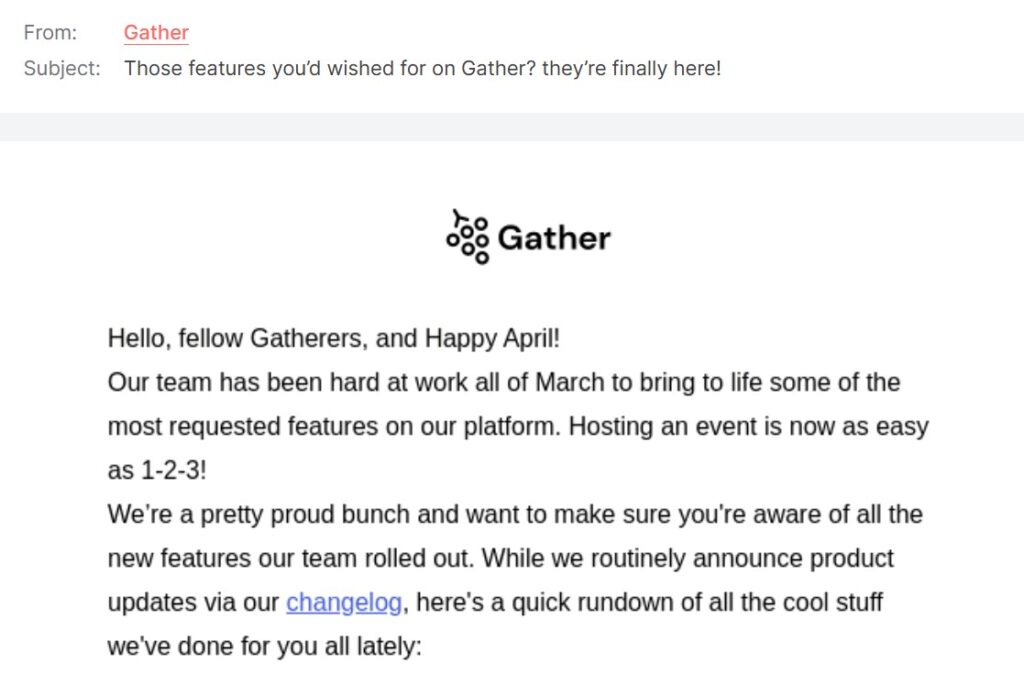
Image via Really Good Emails
10. [Necessary Task]: Why You are Stuck
This is another good example. State a task your audience might struggle with. It could be organizing their offices, cleaning their closets, buying a new car, or taking their businesses to the next level. Explain why they might feel stuck and how to get — get—unstuck.
11. Steal These [Assets] from Us
People love email subject lines like this one because they’re irreverent and utterly contradictory to what they think a business might want to do. Do most businesses want you to steal from them? Of course not.
But if you make “stealing” okay, you create a great relationship with your prospect. Offer free assets related to your industry.
12. These 6 Skills Will Pay the Bills!
We love this subject line because it works on three separate levels.
First, it uses a number. You might already know from research on writing headlines that numbers work extremely well when getting consumers to click.
We also like it because it suggests education. You’ll teach your prospect something valuable — for free — which paints you in a generous light.
Lastly, it rhymes. You might think we’re joking, but we’re not. People respond to wordplay even if they don’t consciously realize it. They’ll take a second look at the subject line because of the rhyming words “skills” and “bills.”
13. [Strategy] not Working? Download this Ebook
This subject line is just six (or maybe seven) words long. However, it packs in a ton of information.
From these few words, your prospect gleans several things:
- You understand what they’re trying to do.
- You know that their current strategy isn’t working.
- You have a solution to that problem.
Genius, right?
Examples of this headline could be:
- Marketing not working? Download this ebook
- Resistance training not working? Download this ebook
- Recipes not working? Download this ebook
Ensure you have the mentioned ebook for your prospects to download.
Additionally, you could replace the word “ebook” with any asset. It might be a template, white paper, audio file, video, or something else entirely. 1973 Ltd jumps straight into asking you to download its marketing guide.
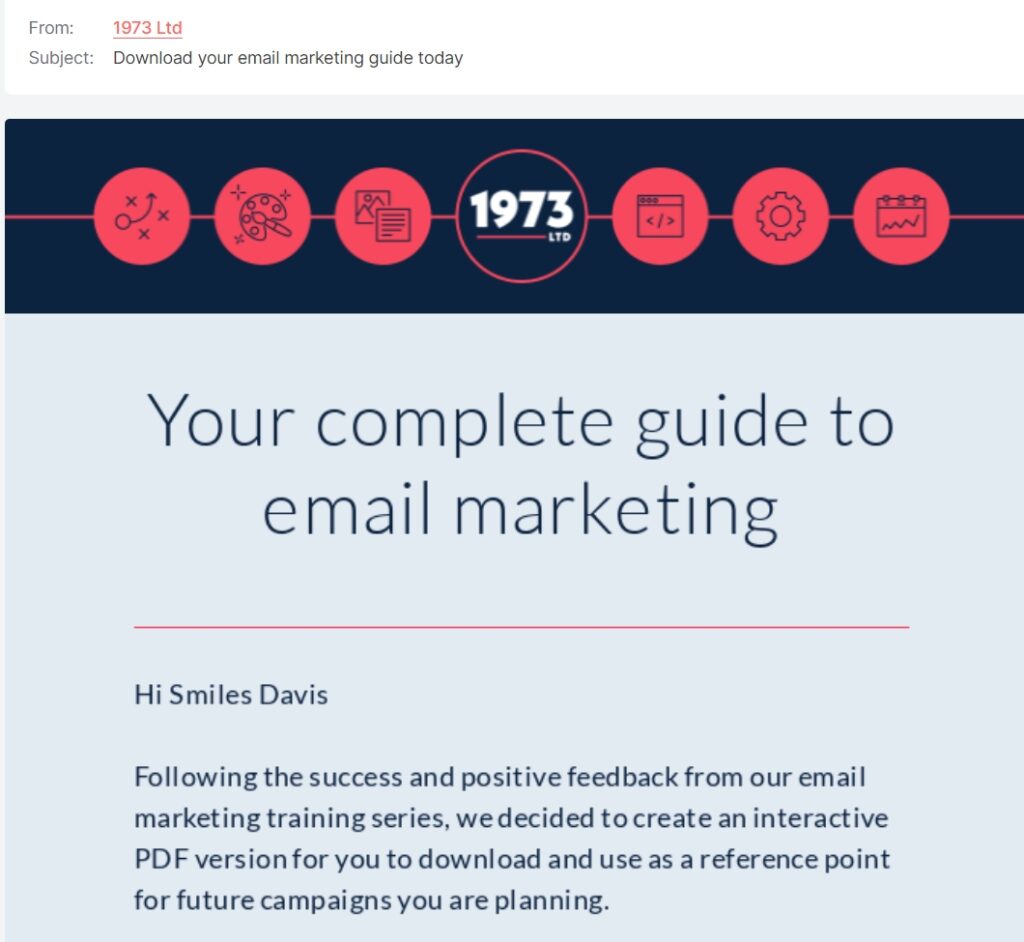
Image via Really Good Emails
14. Less ___ = More ___!
The less equals more equation is used in various of marketing materials, but it also works in email subject lines. You’re communicating value in just a few words.
Fill in the blanks with information related to your industry. It could relate to the products or services you sell, or it could relate to information you’re willing to impart.
The important thing is that an equation exists. People like to see things balance out, even if they hated math in high school.
15. Reduce [Undesired Outcome] Now
Fear is a powerful motivator. Why do you lock your car doors? You fear getting your car stolen. Why do you pay your bills? You fear going into debt.
You can use fear avoidance in your email subject lines. Instead of telling people how to achieve a goal or solve a problem, tell them how you can help eliminate a pain point.
16. Unlock Exclusive Content Inside
This subject line promises the recipient access to something special, which can be particularly effective for email campaigns.
The allure of exclusive content can grab the reader’s attention and drive them to open the email to discover what’s hidden inside. It’s a great way to boost engagement and provide value to your audience. Here’s how Janji uses this email subject line variation.
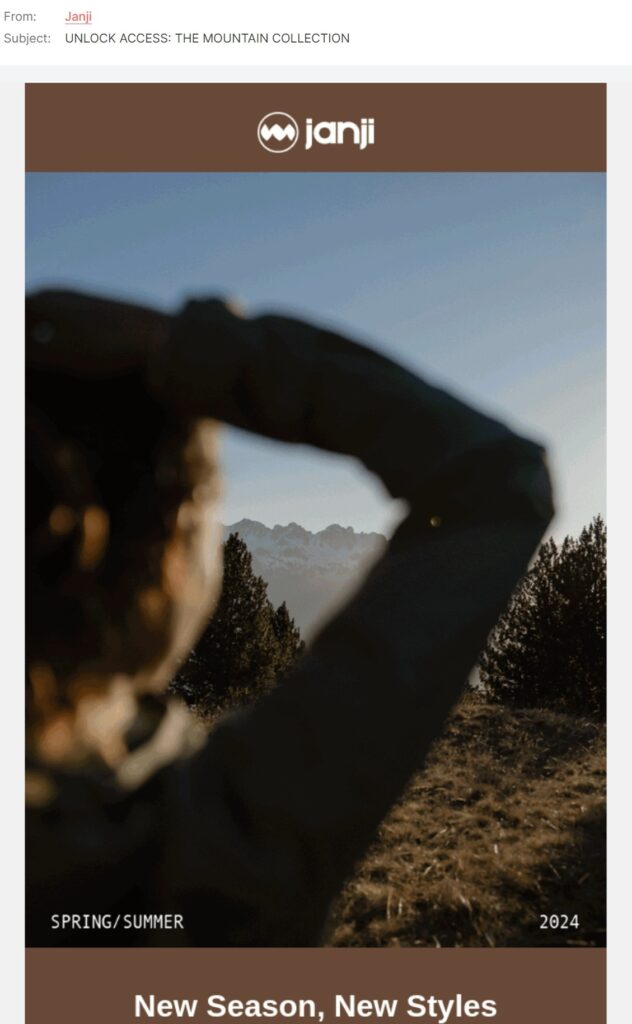
Image from Really Good Emails
17. Is this the Funniest [Industry] Meme Ever?
Funny email subject lines can stand out in a crowded inbox. This example combines humor with curiosity, potentially leading to a higher email open rate. However, to avoid disappointing readers, ensure the content matches the tone set by the subject line.
18. Sneak Peek: What’s Inside Our New Collection
Creating curiosity and offering a glimpse into new products or services can be highly effective.
This subject line draws the reader’s attention by promising exclusive insights. This strategy is effective in boosting open rates and engagement, especially for sales emails and product launches.
19. Unlock the Secrets to [Desired Outcome] Today!
This subject line grabs the reader’s attention and entices them to open the email to learn more by suggesting that there’s a secret to be uncovered.
The choice of phrasing “unlock the secrets” creates intrigue and promises valuable insights that can benefit the recipient. This subject line is particularly effective in email campaigns aimed at educating or providing exclusive tips.
In this example, milk alternative maker Bored Cow uses a variation of this subject line to introduce its new merch store.
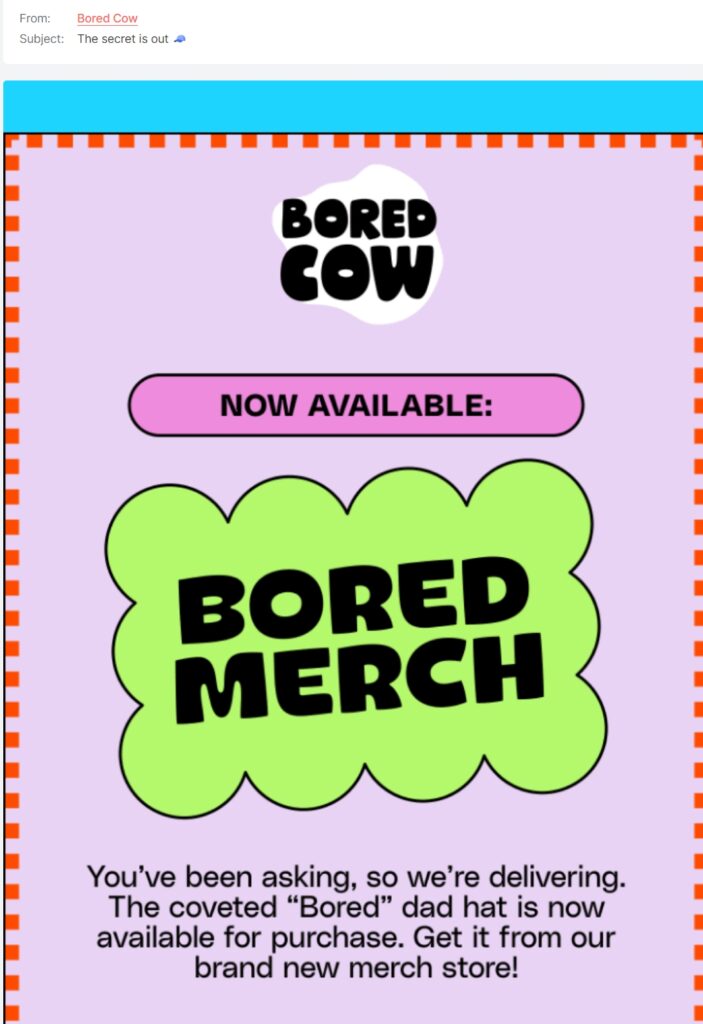
Image from Really Good Emails
20. The [Industry] Hack that’s Causing Controversy
Controversy can be a powerful tool to grab attention. You can craft subject lines that hint at a controversial topic or information that challenges the status quo.
These kinds of headlines prove effective for email campaigns that aim to highlight innovative or disruptive ideas.
21. Oops! We Made a Mistake (and You Benefit)
Honesty in email campaigns can be refreshing. This subject line admits a mistake while hinting at a positive outcome for the recipient. It piques curiosity without making false promises, potentially increasing open rates.
It’s a smart strategy for an email marketing campaign.
This clever subject line immediately captures the reader’s attention by suggesting an unexpected advantage.
This approach is effective when you have an update or correction that benefits the customer. Examples include a surprise discount or an additional feature added to a service.
22. Here’s How [Successful Person] Achieved [Desirable Outcome]
Using a success story can be compelling. You want to tap into the power of social proof and aspirational content, even as you draw on the appeal of learning from others’ successes.
Referencing a successful person in the subject line immediately draws the reader’s attention and promises valuable insights.
23. Can You Help Us Improve? Take Our Survey
Asking for help or feedback engages the recipient and makes them feel valued. This subject line shows your audience you care about their opinions.
It’s a great example of how the right email subject lines can foster a sense of community and collaboration. Here’s an example from Slack.
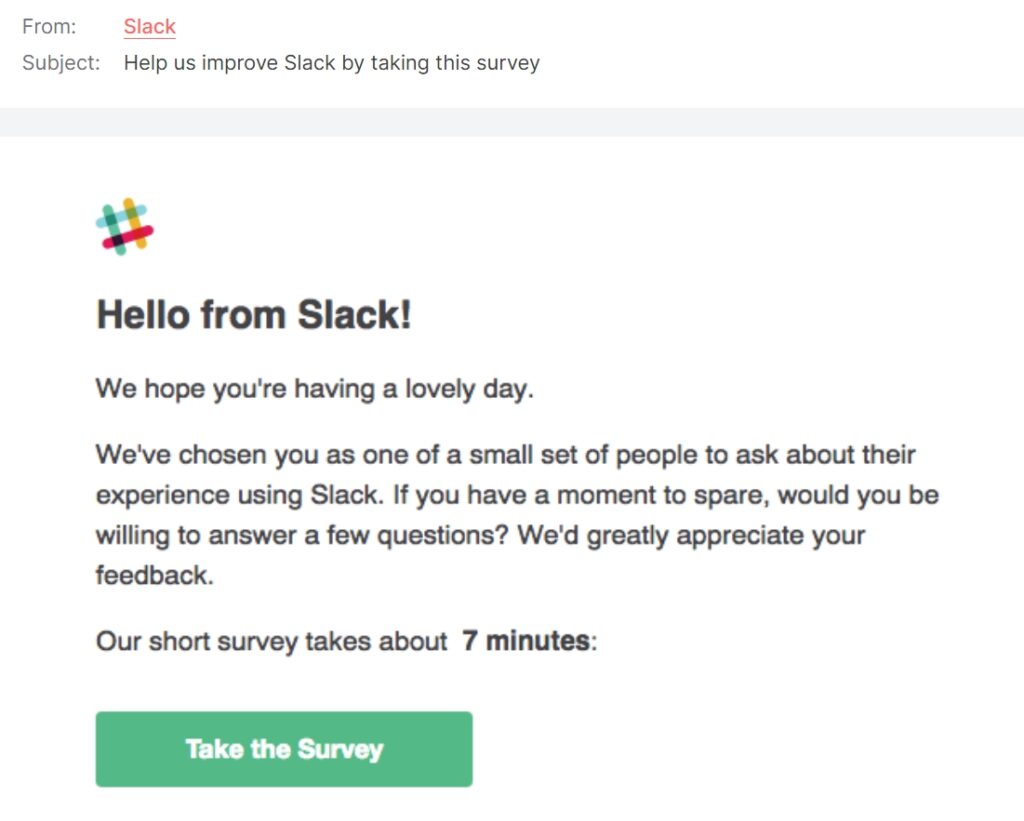
Image from Really Good Emails
24. We Compared the Top 5 [Products/Services] So You Don’t Have to
Offering valuable, time-saving information is a great way to grab the recipient’s attention; it simplifies decision-making.
This subject line promises a helpful comparison of top options in a given category. It appeals to recipients looking for efficient, reliable recommendations.
25. Join Us for a Virtual Coffee Chat about [Topic]
This subject line offers a friendly, low-pressure invitation for cold emails or networking purposes. It suggests a casual, valuable interaction rather than a hard sell, which can appeal to potential contacts or clients.
You can also use this subject line for an exclusive offer, events, or webinars. After all, personal invitations make recipients feel special and appreciated.
Best Practices to Writing Click-Worthy Email Subject Lines
Drafting catchy email subject lines for your email marketing campaigns can make the difference between your message being opened or ignored. Here are a few tips and best practices to follow:
- Keep It Concise: The best subject lines are typically short and concise. Aim for around 40 characters or less to ensure your subject line displays fully on mobile devices. This brevity forces you to focus on the most compelling aspect of your message.
- Use Power Words: Incorporate strong, action-oriented words that evoke emotion or urgency. Words like “exclusive,” “limited,” “secret,” or “breaking” can grab the reader’s attention and encourage opens. The same applies to action-oriented verbs like “discover,” “learn,” or “save” that convey a clear call to action.
- Ask Intriguing Questions: Pose questions that pique curiosity and prompt recipients to open the email for answers. Ensure the email content delivers on the promise implied by the question.
- Create a Sense of Urgency: Without resorting to false promises, use time-sensitive language to encourage immediate action. Phrases like “ending soon,” “last chance,” or “only 24 hours left” can be effective for sales emails.
- A/B Test Your Subject Lines: Regularly test different subject lines to see what resonates best with your audience when you use a mail tester. This data-driven approach can significantly improve your ecommerce email marketing effectiveness over time.
- Consider Preview Text: Although it might not be part of the subject line, the preview text (or preheader) works in tandem with it. The preheader is the additional line of text that appears either below or next to the subject line in some email clients. Use it to provide additional context and entice clicks.
- Address Pain Points: Thoroughly study and analyze your audience’s challenges so that you can create subject lines that promise solutions. This shows you understand their needs and have valuable information to share.
- Optimize for Mobile: Ensure your subject lines are readable on mobile devices. People increasingly check their emails on smartphones, so optimizing for smaller screens is essential.
- Avoid Spam Triggers: Avoid using excessive exclamation points, all caps, or spammy language. Words like “guarantee” and “free” can trigger email filters. While not always problematic, their overuse can hurt deliverability.
- Test Emojis Strategically: Emojis can add visual appeal and help your subject line stand out, but use them judiciously. Ensure they’re relevant to your message and appropriate for your audience.
FAQs
Q1. What is the best subject line for an email?
The best email subject line resonates with your specific audience and aligns with your email’s content. It should be concise, clear, and compelling.
While there’s no one-size-fits-all approach, effective subject lines often create curiosity, offer value, or address pain points.
Q2. What email subject lines get the most opens?
Subject lines that leverage urgency, personalization, or curiosity tend to perform well.
For instance, “Last chance: Your discount expires at midnight” creates urgency, while “John, we’ve handpicked these items for you” uses personalization.
Curiosity-driven lines like “You won’t believe what we discovered…” can also drive high open rates. Ensure to test different approaches with your specific audience.
Q3. How can I test which are the best email subject lines for my audience?
Conduct A/B testing to determine the best email subject lines for your specific audience. Create two versions of a subject line and send them to small, random samples of your email list.
You want to consistently test different elements — length, tone, personalization, or emojis. Send the version that performs better and has the higher open rates to the remainder of your list.
Q4. What are some common mistakes to avoid when writing email subject lines?
Some common pitfalls that can hinder effective email subject lines include using excessive exclamation points, all caps, or spammy language. Additionally, vague or misleading subject lines can frustrate recipients and damage your sender reputation.
Q5. Does the email subject line affect email open rates?
Absolutely. The subject line is often the deciding factor in whether an email gets opened or ignored. It’s your first (and sometimes only) chance to grab the recipient’s attention in a crowded inbox.
A well-crafted subject line can significantly boost open rates, while a poor one can lead to your email being overlooked or marked as spam.
Conclusion
Email subject lines can make or break your marketing campaign. We want yours to succeed.
With the right subject line, you can set the stage for your email’s content and convince even a skeptical recipient to open your message. The best email subject lines not only boost open rates but also increase the chances of click-throughs, which is ultimately your goal.
What makes a great email subject line? It should be persuasive, relevant, and engaging enough to capture your audience’s interest. From personalization to creating urgency, the strategies we’ve explored can help you craft compelling subject lines.
Use Hello Bar to increase email signups, then apply our tips and examples to create subject lines that resonate with your audience. With practice and testing, you’ll soon be crafting catchy email subject lines that drive results.
What’s your favorite email subject line of all time?




